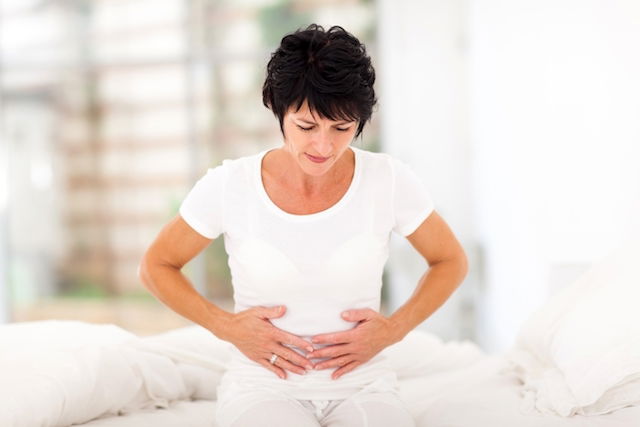Feeling gassy is usually temporary and occurs due to the normal fermentation and digestion of food in the gut. It is usually not a sign of any health conditions, especially if the gas is not smelly.
Being gassy can also happen if you eat too quickly, as this lead to more air being swallowed and air starting to accumulated.
However, feeling gassy can also be a medication side effect, or it may be a sign that food is being digested too slowly. When food runs through the digestive tract slowly, fermentation time increases, leading to more gas production. Slow digestion and increased fermentation can lead to very smelly gas, as well as bloating, general malaise and abdominal pain.

What causes excess gas?
Being extra gassy can be the result of:
1. Swallowing too much air when eating
Eating too quickly, due to stress or anxiety for example, can cause air to enter the body. This contributes to gas formation in the intestines, which can be very uncomfortable and cause abdominal pain.
What to do: In this case, you should slow down when eating to prevent air from entering the body during meals. This can help prevent future bouts of gas from returning. You may also benefit from using some medications, like simethicone and dimethicone.
2. Eating hard-to-digest foods
Some foods, mainly carbohydrates, protein and fats, take longer to digest and take longer to ferment in the intestines. This leads to increased gas production. The main foods responsible for excess gas are:
- Cabbage, broccoli, cauliflower, corn and milk
- Chickpeas, peas, lentils, potatoes
- Beans, sweet potato, yogurt, eggs
- Fizzy drinks, beer, onion, asparagus
Foods that are made up of a combination of fiber and fat can also lead to increased gas production. Some foods can cause gas in some people but not others, therefore it is important to monitor your food intake to determine which foods cause more gas. Read more about foods that cause gas.
What to do: Avoid the food that is responsible for increased gas, and try opting for meals that are light and easy to digest. This can help to promote balance in the intestinal flora and relieve symptoms of excess gas.
In addition, you can drink chamomile tea or sweet grass tea to help eliminate accumulated gas. Check out other foods that reduce bloating that you can incorporate into your diet.
3. Taking antacids or antibiotics
Using antacids or antibiotics can interfere with intestinal flora and impact the fermentation process, leading to increased gas production.
What to do: If you are experiencing a lot of discomfort, you should speak to your prescriber to see if an alternative medication possible or discuss if you should discontinue the medication. The doctor may also assess the need to use additional medication to relieve discomfort caused by gases. In the meantime, you can try these home remedies for gas to complement your medical treatment.
4. Lack of physical activity
A lack of physical activity can slow down digestion, which increases fermentation times and gas. Sedentary people tend to have more constipation, which can also increase intestinal gas formation, as the stools linger in the intestines for longer.
What to do: You should engage in physical activity on a regular basis to improve intestinal function and decrease gas. To start, you may find it beneficial to walk 20 minutes every day and slowly pick-up the pace or distance over time.
5. Constipation
Constipation can also cause increased gas accumulation, as stools remain longer in the intestines. This increases the fermentation time and makes gas elimination for difficult, which can lead to abdominal discomfort.
What to do: It is important to invest in habits that help to fight constipation, like eating a healthy diet rich in fibers, drinking plenty of water throughout the day, and exercising regularly. These factors can improve intestinal function and decrease gas. Get an understanding of which naturally laxative foods are best to treat prevent constipation.
Be sure to also check out other home remedies to try to help you can treat constipation naturally.
6. Fizzy drinks
Drinks with gas can also increase gas production, as you will tend to swallow more air when drinking them.
What to do: In this case, you should avoid drinking fizzy drinks, as you will be able to burp easier and eliminate gases. Check out other ways you can get rid of gas at home.
Gas during pregnancy
Intestinal gas production tends to increase during pregnancy due to decreased digestion from increased progesterone levels. The most common symptoms of gas during pregnancy are:
- Sharp abdominal pain
- Noisy belly
- Abdominal distension
- The sensation of a full stomach
Constipation, which is also common during pregnancy, can worsen the situation. To prevent gas, you should try avoiding foods that cause more gas, drink plenty of water, and engage in physical activity every day, like walking. Read more about how to relieve gas during pregnancy.






























